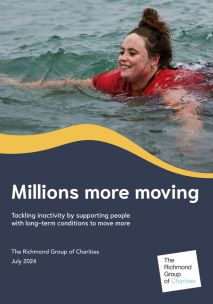The Richmond Group of Charities has published a new report entitled ‘Millions More Moving’ which uses lived experience and insight to inform national policymakers on how to tackle physical inactivity by supporting people with long-term conditions to move more.
The report sets out three ‘shifts’ in the policy landscape which can help to maximise the role of movement in health. These shifts would i) ensure leadership and accountability; ii) embed movement in healthcare, and iii) encourage movement as part of everyday life.
 The Richmond Group is a coalition of 13 national health and care charities working together to help people living with long-term, multiple or complex health needs to live well and thrive.
The Richmond Group is a coalition of 13 national health and care charities working together to help people living with long-term, multiple or complex health needs to live well and thrive.
In its Executive Summary, the report states: “Our nation’s mental and physical health is in a precarious state, yet one effective and inexpensive solution is too often ignored: helping people with long-term conditions to move more.
INCREASES
“Comprising up to 20 million people in England, adults with long-term conditions are one of the most inactive groups. They are twice as likely to be inactive as the general population, and the likelihood of inactivity increases with the number of conditions someone has.”
It concludes: “The time to act is now. We are calling for three shifts national policymakers can set in motion to tackle inactivity, support people with long-term conditions and get millions moving.”
The report explains how the health and economic benefits of movement for people with long-term conditions are too important to be ignored. It can help manage more than 20 common health conditions, and every £1 spent on increasing physical activity generates £4 of savings across health, communities and the economy.
INEQUALITIES
Supporting people with long-term conditions to move more could help reduce inequalities. Long-term conditions are more common (and more likely to be severe) in older people and in people from lower socio-economic groups, who are also more likely to live with multiple conditions, including a mental health condition. The report includes analysis which shows that inactivity among people with long-term conditions is amplified by age, gender, ethnicity and socio-economic group.
The report states: “National government, sport governing bodies, NHS England, professional bodies in health and in sport, local authorities, local healthcare systems and the voluntary sector, including the Richmond Group of Charities, all have a role in improving the support system surrounding people with long-term conditions so they can move more and the inactivity inequity gap can be reduced.”
Read the report ‘Millions More Moving’. You can also read the report’s Executive Summary and Accessible Version.









